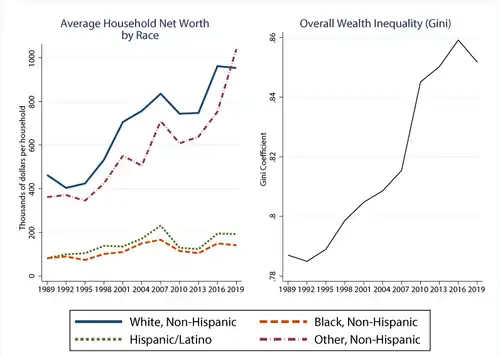Richard Haier

| The colorful pseudoscience Race & Racialism |
| Hating thy neighbour |
| Divide and conquer |
| Dog-whistlers |
|
v - t - e
|
“”I enjoyed our conversation too!
|
| —Richard Haier, responding to Bo Winegard's appreciation for his appearance on Winegard's "sociobiology" Substack Aporia[1] |
Richard Haier (1949–) is an American psychologist, Professor Emeritus in the Pediatric Neurology Division of the School of Medicine at University of California, Irvine.
Haier is an hereditarian: heis a disciple of Arthur Jensen, a supportive colleague of Bo Winegard[1] a former editor of Intelligence and an author for Quillette.[2]
Haier and Jensen

The Southern Poverty Law Center considers Arthur Jensen a white nationalist.[3] Richard Haier is one of his most devoted disciples.
During his Distinguished Contributor Interview with David Lubinski![]() at the 2012 ISIR conference, Haier was asked who his heroes were. He mentioned Hans Eysenck a supporter of Arthur Jensen[4] and Jensen.[5]
at the 2012 ISIR conference, Haier was asked who his heroes were. He mentioned Hans Eysenck a supporter of Arthur Jensen[4] and Jensen.[5]
For his 2021 Lifetime Achievement Address Haier said: "In 1988, Arthur Jensen actually arranged for me to get private funding for a small conference of about a dozen people, to discuss the impact that this kind of PET scanning would be having on intelligence research."[6]
In his interview with Lex Fridman,![]() Haier said:[7]
Haier said:[7]
HAIER
I want to say one more thing about Jensen. He was once asked by a journalist straight out, are you a racist? His answer was very interesting. His answer was. "I thought about that a lot. And I've concluded it doesn't matter." Now I know what he meant by this… he was a very unusual person. I think he had a touch of Asperger's syndrome to tell you the truth… with respect to group differences, he called it the default hypothesis.
Jensenism
Haier often refers to Jensen's paper How Much Can We Boost IQ and Scholastic Achievement?.![]() [8][9] and he apparently considers this, more than anything else, the most convincing evidence that Black Americans as a group have had lower test scores due to genetic deficiencies. The paper was a review of some government-funded "compensatory education programs" and since they did not succeed in improving test scores, Jensen concluded that "Intelligence, as measured by IQ tests, is about 80 percent heritable."
[8][9] and he apparently considers this, more than anything else, the most convincing evidence that Black Americans as a group have had lower test scores due to genetic deficiencies. The paper was a review of some government-funded "compensatory education programs" and since they did not succeed in improving test scores, Jensen concluded that "Intelligence, as measured by IQ tests, is about 80 percent heritable."
Social psychologist Richard E. Nisbett![]() discussed the problem with the term "heritability":
discussed the problem with the term "heritability":
The hereditarians begin with the assertion that 60 percent to 80 percent of variation in I.Q. is genetically determined. However, most estimates of heritability have been based almost exclusively on studies of middle-class groups. For the poor, a group that includes a substantial proportion of minorities, heritability of I.Q. is very low, in the range of 10 percent to 20 percent, according to recent research by Eric Turkheimer at the University of Virginia. This means that for the poor, improvements in environment have great potential to bring about increases in I.Q.
In any case, the degree of heritability of a characteristic tells us nothing about how much the environment can affect it. Even when a trait is highly heritable (think of the height of corn plants), modifiability can also be great (think of the difference growing conditions can make).[10]
The article also discusses the Flynn effect.![]()
That environment can markedly influence I.Q. is demonstrated by the so-called Flynn Effect. James Flynn, a philosopher and I.Q. researcher in New Zealand, has established that in the Western world as a whole, I.Q. increased markedly from 1947 to 2002. In the United States alone, it went up by 18 points. Our genes could not have changed enough over such a brief period to account for the shift; it must have been the result of powerful social factors. And if such factors could produce changes over time for the population as a whole, they could also produce big differences between subpopulations at any given time.
In fact, we know that the I.Q. difference between black and white 12-year-olds has dropped to 9.5 points from 15 points in the last 30 years, a period that was more favorable for blacks in many ways than the preceding era. Black progress on the National Assessment of Educational Progress shows equivalent gains. Reading and math improvement has been modest for whites but substantial for blacks.
Remove all the history
The tests that Jensen examined were administered to Black children during the era of Jim Crow laws which lasted until 1965, a mere four years before Jensen's paper was published. In 1967 the Loving v. Virginia decision ruled laws against "inter-racial" marriage were unconstitutional, which was only two years before Jensen's paper.
During the time period that Jensen reviewed, the United States was such a hostile environment for Black children's educational prospects that a librarian called the police on astronaut Ronald McNair![]() when he was nine years old and tried to check out books from the library:
when he was nine years old and tried to check out books from the library:
"Well, this old librarian, she says, 'This library is not for coloreds.' He said, 'Well, I would like to check out these books.'
"She says, 'Young man, if you don't leave this library right now, I'm gonna call the police.'[11]
This was in 1959, only ten years before Arthur Jensen (and his disciples like Richard Haier) decided Black children are hopeless.
This historical context is ignored or denied by hereditarians, evidence of the hereditarian political strategy to remove all the history.
Jensenism in the twenty-first century
Jensen's beliefs, called Jensenism![]() were carried on directly through the "Institute for the Study of Educational Differences"[12] and under that name received at least $337,500 from the Pioneer Fund.[13] Its name was changed to "Institute of Mental Chronometry." The organization is closely tied to ISIR, which Haier has been involved in during most of its history
were carried on directly through the "Institute for the Study of Educational Differences"[12] and under that name received at least $337,500 from the Pioneer Fund.[13] Its name was changed to "Institute of Mental Chronometry." The organization is closely tied to ISIR, which Haier has been involved in during most of its history
Hereditarians and libertarians
As a professor at University of California, Irvine, Haier was a signatory to Linda Gottfredson's "Mainstream Science on Intelligence" which was an effort by hereditarians to defend The Bell Curve.
Among its claims:
- "Heritability estimates range from 0.4 to 0.8 … indicating genetics plays a bigger role than environment in creating IQ differences".
- "Although the environment is important in creating IQ differences, we do not know yet how to manipulate it".
Studies indicate that poverty has a large impact on IQ test results[14] and IQ is related to family income.[15] These studies demonstrate that we do know how to manipulate the environment, but the method would require the large-scale reduction of poverty, as in the case of government action.[16].
Libertarian organizations have a history of both defending hereditarians, as when The Atlas Society![]() defended James Watson's racist claims.[17]
defended James Watson's racist claims.[17]
Haier gave an invited paper to the American Enterprise Institute in 2007 on "Brain imaging studies of intelligence in men and women."[18] It was part of the "Women and Science" event that included Christina Hoff Sommers and Amy Wax![]() .
.
The hereditarian equation

In spite of the many studies that demonstrate the influence of poverty on IQ test results, hereditarians believe that low intelligence causes poverty.
Richard Haier is a firm believer in the hereditarian equation (intelligence = money) as shown in his interview with Scott Barry Kaufman in 2020:
HAIER
You wanna talk about serious social problems? Yeah, you got 51 million people doesn't matter, race you know, doesn't, religion doesn't, voting preferences doesn't matter. You got 51 million people who do not have the mental abilities to hold high paying jobs and possibly even care for themselves. This is a very large number of people. Now. These people -
KAUFMAN
...that seems like a pretty deterministic statement though that you just said -
HAIER
no, I'm just,
KAUFMAN
you mean probabilistically.
HAIER
It's probabilistic that look, in the United States there are about 43 million people living below the poverty line is determined. By some government agency that does this. So think of a Venn diagram. You got 43 million people living in poverty. You got 51 million people with IQ's. That are low enough to make it everyday life difficult for them. There's got to be overlap between those two universes, those two sets of people. So if you could tweak IQ by just a little bit and move people from 85 to 90 or from 80 to 85. This is going to have a gigantic ripple effect on many, many social problems.[20]
The error of the hereditarian equation can be quickly found in statistics from the Federal Reserve. The net worth of Whites over Blacks has increased enormously in the past thirty years.[19] It seems doubtful that even Richard Haier would claim White intelligence increased genetically compared to Black intelligence in only thirty years.
Haier repeats the claims about low IQ Americans in an interview with Lex Fridman.[21][22] During the interview Fridman lists for Haier four critiques of The Bell Curve by Stephen Jay Gould. Instead of addressing Gould's critiques directly, Haier launches into an attack on Gould for his political views, a standard response by hereditarians to the mention of Gould's name.[23] Nor does Fridman ask Haier about studies used in The Bell Curve funded by the Pioneer Fund or the use of work by J. Philippe Rushton.
Haier's recommendation
Haier is a fervent believer in the American hereditarian assumption, so when Fridman asks him for a solution to improve Black Americans' prospects, he recommends altering their defective genes:[24]
HAIER
…you also asked me what is the science after The Bell Curve. And the short answer is there's not much new work, but whatever work there is supports the idea that there still are group differences. It's arguable whether those differences have diminished at all or not. And there is still a major problem in underperformance for school achievement. For many disadvantaged and minority students, and there's so far is no way to fix it…
FRIDMAN
What do we do with this information?
Then finally…
HAIER
...And what I think we should do with this information is. Unusual. Because I think what we need to do is fund more neuroscience research on the molecular biology of learning and memory…
The white nationalists at American Renaissance liked the interview so much that they shared it on their website.[25]
Haier is spending his emeritus years appearing on podcasts to promote that "unusual" policy approach.
International Society for Intelligence Research
Mainstream Science on Intelligence
The Southern Poverty Law Center said of the paper:
The only thing linking many of Gottfredson’s co-signers to the field of IQ research at all was a commitment to the idea of innate racial differences in intelligence. While only 10 of these scientists were actual experts in the field, at least 20 were recipients of money from the Pioneer Fund, including one director of the Fund, R. Travis Osborne, and two future presidents, J. Philippe Rushton and Richard Lynn.[26]
Mainstream Science on Intelligence is a sort of founding document for the International Society for Intelligence Research (ISIR). Not only is it featured on the ISIR website, described as "a classic"[27] but many of the signatories went on to participate in ISIR governance and conferences. These include Gottfedson, Jensen, Haier, David Lubinski, Eysenck, Rushton, Lynn, Douglas K. Detterman,![]() Robert Plomin and Thomas Bouchard.[28] Several of these are also recipients of money from the Pioneer Fund.
Robert Plomin and Thomas Bouchard.[28] Several of these are also recipients of money from the Pioneer Fund.
The Bell Curve and papers by Plomin, Bouchard, Rushton and Lynn were cited in the manifesto of the 2022 Buffalo mass-murderer![]() — see Bouchard, Plomin, Deary, and the 2022 Buffalo shooter manifesto.
— see Bouchard, Plomin, Deary, and the 2022 Buffalo shooter manifesto.
Organization roles
Haier was Secretary/Treasurer of the organization in 2012-2014, and President in 2016.[29]
ISIR Conferences
ISIR has been holding conferences since 2000, except 2020. The conference locations alternate typically between the United States one year, and outside of the United States the next year, usually in Europe. In 2021 the conference was held online.
ISIR conferences are a who's who of white nationalists, race pseudoscience promoters, and right-wing political operatives.
At the 2012 ISIR conference, Richard Haier expressed his appreciation for ISIR:
I'm also proud to be associated with people in this association, because we all share, not only an interest in intelligence research. but we're all dedicated to work in a field that is not regarded as mainstream, that has many difficulties associated with it, but we all persevere nonetheless. And so I'm very proud that there's a whole group of people that I can kind of hang out with and and talk to about this stuff.[5]
2002

Haier first participated in an ISIR conference in 2002[30] which featured Arthur Jensen presenting an invited address on "Mental Chronometry." Although Mental chronometry![]() [note 1] has since been proven a dead-end for hereditarianism,[31] the term lives on in the name of an organization founded by Jensen and other members of the ISIR, called the Institute of Mental Chronometry.[12] In 2023 the Institute gave a grant of over half a million dollars to two individuals associated with the ISIR, Emily Willoughby and James Lee.[32]
[note 1] has since been proven a dead-end for hereditarianism,[31] the term lives on in the name of an organization founded by Jensen and other members of the ISIR, called the Institute of Mental Chronometry.[12] In 2023 the Institute gave a grant of over half a million dollars to two individuals associated with the ISIR, Emily Willoughby and James Lee.[32]
Also featured at the 2002 conference was J. Philippe Rushton, giving presentations on "African and non-African Students" and "Black White Differences." The same year, Rushton became president of the Pioneer Fund.[33]
2002 was also the year that Rushton and Richard Lynn appeared at an American Renaissance conference[34] along with people like Jared Taylor. They presented a speech "In Search of the African IQ."
The association of Rushton and Lynn with an extremist racist organization had no negative impact on future invitations to participate in ISIR conferences for Rushton or Lynn. Given the other extreme racists and white supremacists who have appeared at ISIR conferences, it likely had a positive impact on future ISIR invitations.
2003-2011
Haier gave presentations at the 2005 conference, and chaired a symposium.[35] Rushton and Jensen also participated in the conference as did Kevin MacDonald, a white nationalist who was influential in the development of the Natural History of Ashkenazi Intelligence hypothesis.
Haier gave presentations at the 2006 conference.[36] Rushton participated in the conference as well as Richard Lynn.
In addition to Haier, the 2007 conference included Rushton, Jensen, MacDonald, Lynn, Heiner Rindermann and Donald Templer![]() [37] who would go on to co-author a paper with Rushton that was later retracted,[38] but still found its way into the 2022 Buffalo shooter's manifesto.
[37] who would go on to co-author a paper with Rushton that was later retracted,[38] but still found its way into the 2022 Buffalo shooter's manifesto.
Haier participated in a session called "Gray Matter and Intelligence Factors: Is There a Neuro-g?" at the 2008 conference.[39] Rushton, Lynn, Rindemann and Gottfredson were among the conference participants.
Haier participated in the 2009 conference which included a session by Rushton and Jensen called "The Rise and Fall of the Flynn Effect as a Reason to Expect a Narrowing of the Black-White IQ Gap." Kathryn Paige Harden![]() also participated, who gave a presentation entitled "Why Don’t Smart Kids Have Sex? A Twin-Control Study."[40]
also participated, who gave a presentation entitled "Why Don’t Smart Kids Have Sex? A Twin-Control Study."[40]
The 2010 conference featured, in addition to Haier, a talk by Arthur Jensen called "Ratio Scale Measurement of Mental Processes by Means of Mental Chronometry" and Rushton and Templer gave a talk on "IQ, Pigmentocracy, Crime, and Income in 50 U.S. States."[41]
2012-2021



The program for the 2012 conference featured Francis Galton on the cover and inside noted the deaths of Jensen and Rushton. Haier received "Distinguished Contributor Award." The conference included participation from Aurelio J. Figueredo.[42]
At the end of the program, Haier affirmed his devotion to the hereditarian belief that intelligence equals money and mentions Jensen's "mental chronometry."
…if you took all the money in the world and divided it equally in six months, the same people would have it back. And I think that's a a very cynical statement with an element of truth about intelligence in it though. So right now, I'll just say one more thing about that. Right now, all our measures of intelligence by and large are relative to other people. And I believe that Art Jensen was on the right path when he said we have to move beyond that, that G is a fact of nature, and to make it, and to make intelligence research a natural science, we need to have a way to measure G that's not limited to our relative measures, that we need that we need something like what he called mental chronometry and the actual timing of information processing around the brain. And we now have the technology to do that. And I'm going to show you, I'm going to show some of that actually on Saturday. So I think that we're moving in a very nice direction — at some point, the phenomenon that we're studying, you know, one of the professors at Hopkins used to say Warren Torgeson, I went to Warren Torgeson once with a question about significance levels. Warren Torguson helped develop multidimensional scaling. He was a preeminent mathematical psychologist. And he listened and he said, well, you know. If what you're studying is big enough to be important, it's big enough for you to find without a significance test.
You think about this. Global climate change. Think about climate change. Does this really depend on a P of .05 on some variable? No. You look out your window and you see the ocean coming into your house. That's what convinced people of climate change almost overnight. And I think we are on the verge of having brain measures that are real racial measures in terms of milliseconds where you can see millisecond by millisecond what the brain is doing throughout the brain as person is solving G-loaded problems and I think this gives us the opportunity for a new kind of definition of intelligence. And moves us more toward making the study of intelligence more like a natural science, just like the study of black holes.[5]
The 2014 conference program was a minimalist two-page "overview." It indicated that Haier chaired a talk on "Individual differences vs group averages: Time to choose one and abandon the other for brain imaging studies?" Susan Pinker,![]() and Richard Lynn were conference participants.[43]
and Richard Lynn were conference participants.[43]
At the 2015 conference,[44] Haier introduced Steven Pinker's "President’s Invited Address: Intelligence Research and the Craft of Writing" available on YouTube.[45] During the speech Pinker suggested that opponents of race pseudoscience claims, like Malcolm Gladwell![]() and Stephen Jay Gould, have an advantage over proponents of race pseudoscience because they are better writers. Also participating in the conference: Quillette author Alice Dreger,[46] and Rindermann.
and Stephen Jay Gould, have an advantage over proponents of race pseudoscience because they are better writers. Also participating in the conference: Quillette author Alice Dreger,[46] and Rindermann.
Haier participated in the 2017 conference along with Willoughby, Lee and Toby Youngof the Ulster Institute for Social Research.[47] Steven Pinker was interviewed by David Lubinski for the "ISIR Distinguished Contributor Interview, 2017" available on YouTube.[48] During the interview Lubinski asked Pinker how he became so interested in "human psychological diversity" when previously he had "found individual differences 'uninteresting'." It seemed that what changed his mind were people who would eventually be ISIR conference participants:
PINKER:
…You can compare humans to chimpanzees, there are a number of ways of getting at it. But one of them has to be well, let's look at the differences in the genes and see how they correlate with differences in psychological abilities. Another was the fact that — I didn't appreciate until reading an article by Tom Bouchard and his colleagues in the late 80s in Science, that pointed out a problem that I had a deepening appreciation of, that behavioral genetics isn't just the study of the genetic influences but it leads to surprising discoveries about environmental influences, mainly the small contribution of the so-called shared environment, which I think came as a surprise to everyone, pointed out by Robert Plomin and Sandra Scarr, David Rowe and later Judith Harris.[48]
At the online conference in 2021 Haier received the "Lifetime Achievement Award."[49] Other conference participants included the "23andMe Research Team," Quillette author Damien Morris,[50] Rindermann, Emily Willoughby, James Lee and Gregory Clark an economist, whose work, according to a review in The Economist of his book The Son Also Rises, "…implies, however, that poor blacks remain so because they are descended from people with low social competence; discrimination is irrelevant, except to the extent that it limits intermarriage with other groups."[51][52]
2022
Haier was not listed as a participant in 2022, but Pinker was an invited speaker at the conference and gave a speech titled "Rationality: What it is, why it seems scarce, why it matters."[53]
Bouchard, Plomin, Deary, and the 2022 Buffalo shooter manifesto
The Buffalo mass-murderer's 180-page manifesto cites many race pseudoscience sources. Some of them have been participants at International Society for Intelligence Research conferences:
- "Genetic Influence on Human Psychological Traits: A Survey" by Thomas Bouchard, Jr.:[54] Bouchard is associated with ISIR and has received money from the Pioneer Fund.[28]
- The shooter's comment for the citation: "Most if not all psychological traits are substantially influenced by genetics."
- "Genetics and intelligence differences: five special findings" by Robert Plomin and Ian Deary:[55] Both Plomin and Deary are ISIR conference participants.
- The shooter's comment: "All behavioral traits are substantially heritable. Evidence for this is ubiquitous."
- The retracted article, "Do pigmentation and the melanocortin system modulate aggression and sexuality in humans as they do in other animals?" by J. Philippe Rushton and Donald I. Templar[38]
- The shooter's comment: "Darker pigmented people average higher levels of aggression and sexual activity, and lower IQ."
- "Racial and ethnic differences in psychopathic personality" by Richard Lynn:[56] Lynn was an ISIR conference regular.
- The shooter's comment: "Blacks are 50% more likely to cheat on their spouses than Whites. Blacks have less perseverance than other races."
- The Limits of Democratization: Climate, Intelligence, and Resource Distribution by Tatu Vanhanen:
 [57] Vanhanen also co-authored a book with Richard Lynn called IQ and the Wealth of Nations.
[57] Vanhanen also co-authored a book with Richard Lynn called IQ and the Wealth of Nations. [58]
[58]
- The shooter's comment: "The world’s thirty least intelligent countries (except for Haiti) are all in sub-Saharan Africa.
In addition to ISIR conference participants, the shooter also cited an article by journalist Nicholas Wade![]() in The New York Times[59] Wade is a promoter of race pseudoscience and the Natural History of Ashkenazi Intelligence hypothesis.
in The New York Times[59] Wade is a promoter of race pseudoscience and the Natural History of Ashkenazi Intelligence hypothesis.
- The shooter's comment: "Over 2000 genes have been subject to recent (post out-of-Africa) evolution. Europeans and Asians are subject to more recent evolution than Africans."
2023
The 2023 conference included Haier, Gregory Clark, Willoughby, and Steven Pinker.[60]
Intelligence
As the editor of Intelligence, the publication of the International Society for Intelligence Research, Haier is an important figure in the quest to promote impactful hereditarianism:
Another signatory was a less well-known figure: Richard Haier, a psychologist and now emeritus professor at the University of California, Irvine. Haier is the editor of Intelligence, a journal belonging to the major international scientific publishing group Elsevier, which also publishes the highly prestigious journals Cell and The Lancet. Unlike The Mankind Quarterly, Intelligence is considered a reputable mainstream publication, with bona fide academics on its editorial board. Yet many Pioneer Fund grantees — Gottfredson, Bouchard, and Rushton among them — have had dozens of papers published in the journal. After Rushton died in 2012, the journal printed a gushing obituary comparing him to the 18th-century English social economist Thomas Malthus, whose memorial in Bath praised him for his “spotless integrity.” It is with people like Haier at the respectable end of academia that this story reaches out of the fringes of science and into its core.[28]
Resignation
In December 2024 Aporia reported that Haier was stepping down as editor-in-chief of Intelligence. Haier's X/Twitter account confirms his status as the former editor of Ingelligence as of January 2025.[61]
Richard Haier and "race differences"
Denial of racism
In his interview with Scott Barry Kaufman, Haier claims that he has avoided commenting on race differences, while speculating that Arthur Jensen had "a touch of Asperger syndrome." He claims that there was "no racism" in private conversations with "players in that (race difference) space."
HAIER
In fact I never commented on the race difference thing up until I did this lecture in the end. I recorded at the end of 2013. So I literally went decades without any public discussion of this. I mean I know or have met most of the players in that space. It's a relatively small space compared to the rest of intelligence. And so. You know, just from a historical point of view, I had many, many private conversations with most of the key people. And in private conversation there was no racism. There was just kind of an interest in explaining away these these test differences or it's not. Necessarily explaining them away, but explaining where they came from.[20]
Alliances with racists and white nationalists
Like Steven Pinker,[62] Haier's approach is to deny hereditarian racism while aligning with racists and other promoters of race pseudoscience.
Stefan Molyneux

Haier had a friendly visit on white supremacist Stefan Molyneux's podcast in March 2018.
Haier and Molyneux were in agreement about virtually everything, especially their belief that environment counts for nothing and the only way to improve intelligence test scores is genetic manipulation. Haier was very sad that the American government has not hopped on board the eugenics train yet:
HAIER:
Well, unfortunately now in our country we're living in a time that's profoundly anti-science. We have many government heads and important agencies who are overtly anti-science. I don't understand it, but it's not good. And it's not good in general for for many scientific things and for the kind of things we're talking about here, which are kind of far out. Not many people are talking about manipulating genes that raise IQ. This is not really a public conversation, and to the extent it is, it's usually framed in some negative context of eugenics or or racism or or or or something like that.[63]
But Haier and Molyneux are wrong. An October 2023 article in The New York Times finds that:
Research shows that the more funding schools get, the better students do. Instead of schools being financed with varying amounts of money based on property taxes, most states now spend the same amount per student, or more for students in low-income schools. The bigger disparities are now among states.
But as differences in school funding have shrunk, differences in other resources in children’s lives have grown. Children are increasingly likely to live and attend schools in neighborhoods of concentrated poverty or affluence. Since the mid-1990s, neighborhoods have become more segregated by income — but only for families raising children, Professor Owens found. As school districts become more segregated, achievement gaps grow larger, she found.[64]
Haier is unlikely to ever be confronted by findings that are contrary to his beliefs because he will only talk to the utterly clueless such as Lex Fridman, or white nationalists and racists. Meanwhile he promotes genetic engineering over improving children's lives.
See also
External links
- It might be a pseudo science, but students take the threat of eugenics seriously Ben van der Merwe (February 19, 2018) The New Statesman
- Racism is creeping back into mainstream science – we have to stop it Angela Saini (January 22, 2018) The Guardian
- Bankrolling racism: “science” and the Pioneer Fund William H. Tucker (2001) Race and Society Volume 4, Issue 2
- The Heritability Fallacy David S. Moore and David Shenk (2016) WIREs Cognitive Science
- RACE SCIENCE REARS ITS UGLY HEAD Gavin Evans (March 1, 2015) New Internationalist
Notes
- ↑ In the talk page of the Wikipedia entry for "Mental Chronometry" a user named "Ferahgo the Assassin" — believed to be the username of Emily Willoughby — argues that the article should be merged with "Reaction Time"
References
- ↑ 1.0 1.1 I enjoyed our conversation too! Richard Haier (December 15, 2023) Twitter/X
- ↑ Richard Haier Quillette (retrieved January 15, 2023)
- ↑ Arthur Jensen (Retrieved January 18, 2024) Southern Poverty Law Center
- ↑ Hans J. Eysenck, 81, a Heretic In the Field of Psychotherapy William H. Honan (September 10, 1997) New York Times
- ↑ 5.0 5.1 5.2 Distinguished Contributor Interview: Rich Haier Part 2 Timothy Bates (retrieved January 18, 2024) YouTube
- ↑ Richard Haier: ISIR 2021 Lifetime Achievement Award Address ISIR (retrieved January 18, 2024 YouTube
- ↑ Richard Haier: IQ Tests, Human Intelligence, and Group Differences Podcast #302 (Jul 14, 2022) YouTube.
- ↑ The Controversy about Race and Intelligence Research | Richard Haier Robinson's Podcast Clips (Retrieved January 18, 2024) YouTube
- ↑ Arthur Jensen expressed the same view at the end of his 1969 article. Richard Haier (September 9, 2021) Twitter/X
- ↑ All Brains Are the Same Color Richard E. Nisbett (December 9, 2007) The New York Times
- ↑ Astronaut's Brother Recalls A Man Who Dreamed Big (January 28, 2011) NPR
- ↑ 12.0 12.1 Institute Of Mental Chronometry Form 990-PF for period ending December 2004 (retrieved January 18, 2024) ProPublica
- ↑ University of Delaware Inter-Departmental Memo
- ↑ Study finds poverty reduces brain power Kate Kelland (August 29, 2013) Reuters
- ↑ Study finds poverty reduces brain power How Childhood Poverty Affects the Brain] (March 18, 2016) Penn Medicine News
- ↑ Government’s Pandemic Response Turned a Would-Be Poverty Surge Into a Record Poverty Decline Danilo Trisi Center on Budget and Policy Priorities (August 29, 2023)]
- ↑ James D Watson - Another Gadfly Swatted (January 28, 2011) "The Atlas Society
- ↑ Partial List of Lectures (Retrieved January 18, 2024) Richard Haier website
- ↑ 19.0 19.1 Figure 1. Household net worth and income, by race and ethnicity FEDS Notes (October 22, 2021) Board of Governors of the Federal Reserve System
- ↑ 20.0 20.1 Richard Haier on the Nature of Human Intelligence (June 25, 202) The Psychology Podcast
- ↑ The Bell Curve: The most controversial book ever in science - Richard Haier and Lex Fridman Lex Clips (Retrieved January 17, 2024)
- ↑ The Bell Curve: The most controversial book ever in science | Richard Haier and Lex Fridman Transcript (Retrieved January 18, 2024)
- ↑ The Punctuated Politics of Stephen Jay Gould Michael Shermer (October 31, 2003) michaelshermer.com
- ↑ The Bell Curve: The most controversial book ever in science | Richard Haier and Lex Fridman (Jul 19, 2022) YouTube.
- ↑ Richard Haier: IQ Tests, Human Intelligence, and Group Differences (July 14, 2022) American Renaissance. (archive retrieved January 17, 2025)
- ↑ Linda Gottfredson (Retrieved January 17, 2024) Southern Poverty Law Center.
- ↑ ISIR Online - Resources (accessed January 15, 2024) 'International Society for Intelligence Research.
- ↑ 28.0 28.1 28.2 Draper’s Millions: The Philanthropic Wellspring of Modern Race Science by Angela Saini (Dec 16, 2022) Undark.
- ↑ ISIR Officers International Society for Intelligence Research.
- ↑ ISIR Program 2002 International Society for Intelligence Research.
- ↑ See the Wikipedia article on Race and intelligence § Mental chronometry.
- ↑ Lee and Willoughby Awarded Grant to Explore Cognitive Ability through Innovative Research (August 17, 2023) University of Michigan, Psychology.
- ↑ Jean-Philippe Rushton (retrieved January 15, 2024) Southern Poverty Law Center.
- ↑ Fifth American Renaissance Conference (2002) (Retrieved January 19, 2024) American Renaissance.
- ↑ ISIR Program 2005 International Society for Intelligence Research.
- ↑ ISIR Program 2006 International Society for Intelligence Research.
- ↑ ISIR 2007 Program International Society for Intelligence Research.
- ↑ 38.0 38.1 Retracted: Do pigmentation and the melanocortin system modulate aggression and sexuality in humans as they do in other animals? by J. Philippe Rushton & Donald I. Templer (2012) Personality and Individual Differences 53(1):4-8. doi:10.1016/j.paid.2012.02.015.
- ↑ ISIR 2008 Program International Society for Intelligence Research.
- ↑ ISIR 2009 Program International Society for Intelligence Research.
- ↑ ISIR 2010 Program International Society for Intelligence Research.
- ↑ ISIR 2012 Program International Society for Intelligence Research.
- ↑ ISIR 2014 Program International Society for Intelligence Research.
- ↑ ISIR 2015 Program International Society for Intelligence Research.
- ↑ Steven Pinker 2015 Invited Address to the International Society for Intelligence Research by Timothy Bates (Oct 13, 2015) YouTube.
- ↑ Alice Dreger Quillette.
- ↑ ISIR 2017 Program International Society for Intelligence Research.
- ↑ 48.0 48.1 ISIR Distinguished Contributor Interview, 2017: Professor Steven Pinker by Timothy Bates (Jul 22, 2017) YouTube.
- ↑ ISIR 2021 Program International Society for Intelligence Research.
- ↑ Damian Morris (retrieved January 16, 2024) Quillette.
- ↑ Have and Have Not: A new study shows just how slow it is to change social class (February 1, 2014) The Economist.
- ↑ The Son Also Rises: Surnames and the History of Social Mobility by Gregory Clark (2015) Princeton University Press. ISBN 0691168377.
- ↑ ISIR 2022 Conference program International Society for Intelligence Research.
- ↑ Genetic Influence on Human Psychological Traits: A Survey by Thomas Bouchard, Jr. (2004) Current Directions in Psychological Science 13(4):48-151. doi:10.1111/j.0963-7214.2004.00295.x.
- ↑ Genetics and intelligence differences: five special findings by R. Plomin & I. J. Deary (2015) Molecular Psychiatry 20:98-108. doi:10.1038/mp.2014.105.
- ↑ Racial and ethnic differences in psychopathic personality by Richard Lynn Personality and Individual Differences 32(2):273-316. doi:10.1016/S0191-8869(01)00029-0.
- ↑ The Limits of Democratization: Climate, Intelligence, and Resource Distribution by Tatu Vanhanen (2009) Washington Summit Publishers. ISBN 1593680317.
- ↑ IQ and the Wealth of Nations by Richard Lynn & Tatu Vanhanen (2002) Praeger. ISBN 027597510X.
- ↑ Adventures in Very Recent Evolution by Nicholas Wade (July 20, 2010) The New York Times.
- ↑ ISIR 2023 Conference program International Society for Intelligence Research.
- ↑ Richard Haier account "X/Twitter" (archived January 17, 2025)
- ↑ Pinker on "What the Dog Saw." by Malcolm Gladwell (November 17, 2009) Gladwell.com
- ↑ 4025 The Neuroscience of Intelligence | Richard Haier and Stefan Molyneux (March 11, 2018) Freedomain Podcast
- ↑ New SAT Data Highlights the Deep Inequality at the Heart of American Education by Claire Cain Miller (October 23, 2023) The New York Times.